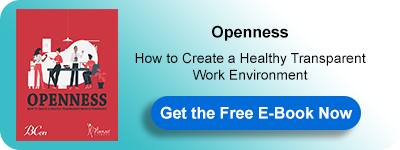The Challenges of Being Open
Openness, like all business and even personal values, is easier to be appreciated and adopted, but living with this value is not the same easiness. Most executives expect their people to be good soldiers and not question company policy, but great leaders welcome different viewpoints and make good use of this momentum for the business’s sake and benefit.
Let’s see some of the challenges that may obstacle transparency and how can leaders overcome these challenges:
Tell the Truth
When followers are asked to rank what they need from their leaders, trustworthiness almost always tops the list. Leaders who are candid and predictable—they tell everyone the same thing and don’t continually revise their stories—signal to followers that the rules of the game aren’t changing and that decisions won’t be made arbitrarily. Given that assurance, followers become more willing to stick their necks out, make an extra effort, and put themselves on the line to help their leaders achieve goals.
Encourage People to Speak Truth to Power
Daring to speak truth to power often entails considerable risk, and building trust takes time and consistency, and the reward is an unimpeded flow of intelligence. Sometimes that includes news and information that executives don’t want to hear. Clearheaded managers appreciate such openness. As one told us, “The only messenger I would ever shoot is one who arrived too late.” Many executives are not that enlightened, however. What they fail to understand is that trust is a symbiotic relationship: Leaders first must trust others before others will trust them.
Practice Having Unpleasant Conversations
Unfortunately, great unintentional harm can be done when people speak honestly about difficult subjects. That’s why managers find it so hard to give performance appraisals to subordinates whose work is not up to par. And since offering negative feedback upward—to one’s boss—is even harder, that occurs even more rarely. There is no way to make giving feedback fun for the bearer of a bad assessment or for the recipient.
But there are methods that help people to hold difficult conversation in the safe environment. The Human Element, which is developed by Dr. Will Schutz based on the FIRO theory is one of those methods. Also, Northrop Grumman found a way to teach executives to handle it gracefully. The company’s recently retired chief ethics officer, Frank Daly, established a program wherein managers can practice having unpleasant conversations. It helps them learn how to deliver negative messages constructively, without being hurtful. The good news is that such exercises appear to be increasingly common in large corporations.
Diversify Your Sources of Information
Leaders have to work hard to overcome the tendency to lock themselves up, figuratively speaking, in hermetically sealed C-suites. They should remind themselves of the secret that all well-trained journalists, consultants, and anthropologists learn: When you’re setting out to understand a culture, it’s best to seek diverse sources of information that demonstrate a variety of biases. This is a simple and obvious point, but rare is the leader who regularly meets with—and listens to—employees, reporters, shareholders, regulators, and even annoying critics.
Admit Your Mistakes
Wise leaders are not afraid to admit their mistakes and uncertainties. It once was said about Gandhi, “He makes no compromise to admit having been in the wrong”. Admitting that you’ve goofed not only disarms your critics but also makes your employees more apt to own up to their own failings.
Build an Organizational Architecture That Supports Openness
This task begins with creating norms and structures that sanction truth telling. Such organizational practices as open-door policies, ombudsmen, protection for whistle-blowers, and internal blogs that give voice to those at the bottom of the hierarchy can help. Introducing comprehensive methods to increase openness can also be useful. The Human Element creates cultures of openness, trust, accountability and engagement and helps individuals, teams and organizations eliminate the behaviors that sabotage, undermine relationships, and lower motivation.
Changing that system is the responsibility of boards of directors. Truly independent boards would go a long way toward providing a needed check on executive ego and a source of objective truth telling. Boards are the last line of defense against ruinous self-deception and the suppression of vital truths. If they’re not vigilant in the pursuit of honesty, the organizations they serve are unlikely to have a free internal or external flow of information.
Set Information Free
Corporate managers tend to keep a great deal of information private that could easily—and usefully—be shared widely. For the past 20 years every employee at SRC Holdings, a diversified remanufacturing company based in Springfield, Missouri, has had access to all financial and managerial information, and each is taught how to interpret and apply it. The net effect, in the words of the company’s CFO, “is like having 700 internal auditors out there in every function of the company.” The firm has extremely high ethical standards and has been a financial marvel, generating impressive profits, creating jobs, and spinning off new businesses sustainably year after year.
As this example illustrates, extensive sharing of information is critical to both organizational effectiveness and ethics. That’s why exemplary leaders encourage, and even reward, openness and dissent. They understand that whatever momentary discomfort they may experience is more than offset by the fact that better information helps them make better decisions. Unfortunately, there is no easy way to institutionalize candor. Honesty at the top is the first step, but true open culture, like a healthy balance sheet, requires ongoing effort, sustained attention, and constant vigilance.1
1https://hbr.org/2009/06/a-culture-of-candor
For more about this topic, download our latest book "Openness" for FREE:
